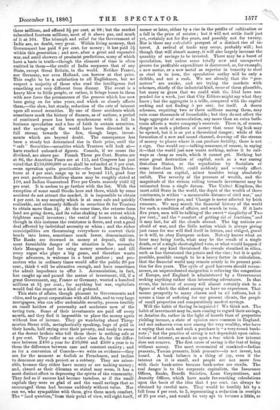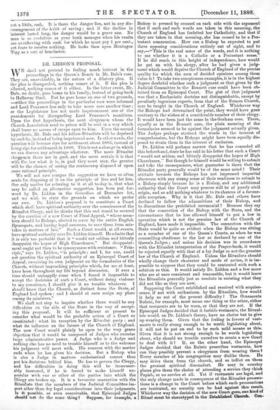THREE-AND-A-HALP PER CENT.
EVERYBODY ought to be very much pleased at the splendid success of the Indian 31- per cent. loan offered on Tuesday, but everybody is not. The India Office wanted three millions, and offered 34 per cent. at 98; but the market subscribed fourteen millions, most of it above par, and much of it at 104. The triumph and relief for the Government of India are, no doubt, very great. Within living memory, that Government has paid 8 per cent. for money ; it has paid 54 within this generation ; and now, after a great and expensive war, and amid showers of pessimist predictions, many of which have a basis in trtath—though the element of time is often omitted in them—the credit of India surpasses that of any State, except Great Britain, in the world. Neither France, nor Germany, nor even Holland, can borrow at that price. This ought to be a satisfaction to all Englishmen, but we suspect a majority of those who read the intelligence feel something not very different from dismay. The event is a heavy blow to little people, or rather, it brings home to them with new force the permanence of the process which has now been going on for nine years, and which so closely affects them,—the slow, but steady, reduction of the rate of interest upon all sound securities. By one of those accidents which sometimes mark the history of finance, as of nations, a period of continued peace has been synchronous with a lull in business speculation and a loss of faith in certain securities, and the savings of the world have been directed in a full stream towards the few, though large, invest- ments which are beyond doubt. The consequence has been a steady but determined rise in their price, until the " safe " Securities—securities which Trustees will look at— have reached unheard-of figures. Consols, if we count the dividend, are above par. French Three per Cent. Rentes are at 86, the American Fours are at 115, and Congress has just voted that £150,000,000 or so shall be refunded at 3 per cent. —an operation quite practicable—the best Railway Deben- tures at 4 per cent, range up to or beyond 113, good four per cent. preference Railway shares may be roughly stated at 110, and Indian Guaranteed Five per Cents, scarcely yield 3i per cent. It is useless to go farther with the list. With the exception of some small Stocks here and there, which by some accident do not attract the market, it is impossible to obtain 4 per cent. in any security which is at once safe and quickly realisable, and extremely difficult in securities fit for Trustees to obtain more than 34. At the same time, the returns from land are going down, and its value shaking to an extent which frightens small investors ; the rental of houses is sinking, though in this instance the resistance is fierce, and rent a good deal affected by individual necessity or whim ; and the richer municipalities are threatening everywhere to convert their bonds into lower, sometimes much lower, denominations. The Banks are drowned in money at deposit, till the most formidable danger of the situation is the necessity their Managers feel for using money somehow ; and till every rogue who plays a big game, and therefore wants large advances, is welcome in a bank parlour ; and pro- moters who in ordinary times would offer the public 20 per cent., think 6 will be attractive enough, and have sometimes the adroit impudence to offer 5. Accumulation, in fact, has caught up and passed the means of investment, till, if a great Government, say, France or Germany, wanted a hundred millions at 34 per cent., for anything but war, capitalists would feel the request as a kind of godsend.
This state of affairs, though pleasant to Governments and cities, and to great corporations with old debts, and to very large mortgagees, who can offer undeniable security, presses terribly on small holders of personalty and moderate men of the saving turn. Some of their investments are paid off every month, and they find it impossible to place the money again without loss of income. They go wandering about Throg- morton Street with, metaphorically speaking, bags of gold in their hands, half crying over their poverty, and ready to swear at the decent brokers who tell them there is nothing safe at 4 per cent. They suffer as no other class do, for the differ- ence between £400 a year for £10,000 and £300 a year is to them the difference between ease and constant anxiety ; and as for a conversion of Consols—we write on evidence—they are for the moment as foolish as Frenchmen, and incline to denounce any such project as a robbery. They are miser- able, because they either have money or are making money ; and, absurd as their dilemma so stated may seem, it has a most distinct effect in depressing the spirits of the community. They feel as if success had become tasteless, as if the small capitals they were so glad of and the small savings that so encouraged them had become suddenly without value. Nor can we, who sympathise with them, give them much comfort. The "land question," from their point of view, will right itself, sooner or later, either by a rise in the profits of cultivation or a fall in the price of estates ; but it will not settle itself just yet, certainly not for five years, and possibly not for twenty. Nor is there any calculable prospect of a distinct rise of in- terest. A revival of trade may occur, probably will ; but though that will absorb money, it will also largely increase the quantity of savings to be invested. There may be a burst of speculation, but unless some totally new and unexpected groove for profitable expenditure is discovered, as, for example, a new motor, or a new metal as superior in tenacity to steel as steel is to iron, the speculative outlay will be only a dribble, and not a rush. We see already that the "pro- moters" are awake, and are trying the markets with schemes, chiefly of the industrial kind, some of them plausible, but many so gross that we could wish the libel laws sus- pended for a week, just that City Editors might say what they know ; but the aggregate is a trifle, compared with the capital seeking and not finding 5 per cent. for itself. A dozen schemes, requiring two or three millions among them, may ruin some thousands of households ; but they do not affect the huge aggregate of accumulation, any more than an extra bath- room affects a water company's reservoir. There is, of course, danger in such a plethora of money that some big leak may be opened, but it is as yet a theoretical danger ; while of the formation of a new and sound channel, drawing off the stream of money to places where it can produce fertility, there is not a sign. One would say—talking nonsense, of course, in saying it—that the world just now wants nothing, unless it be rail- ways as cheap as roads, which it cannot get. Nothing but some great destruction of capital, such as a war among first-class States, or the repudiation by Socialists of some first-class Debt, could suddenly and severely affect the interest on capital, minor troubles being absolutely unfelt. The severity of the pressure of wealth, and the magnitude of the stream rolling towards investment may be estimated from a single datum. The United Kingdom, the most solid State in the world, the depot of the wealth of three continents, is within "a measurable distance of civil war," and Consols are above par, and 'Change is never affected by Irish rumours. We may search the financial history of the world for such a condition of affairs, and search in vain. If it lasts five years, men will be talking of the sweet" simplicity of Two per cent.," and the "comfort of getting rid of fractions," and it may last, for all the clouds abroad. The big nations are afraid of war, and the little nation which is always giving just cause for war will find itself in fetters, and obliged, growl as it will, to obey European orders. Nobody knows what an hour may bring forth, what may be the result of a single death, or of a single short-sighted vote, or what would happen if disease of any kind threatened the cereals sheathed in silica, such as has threatened the potato and the vine; but it is quite possible, possible enough to be a heavy factor in calculation, that the financial world may remain nearly in its present posi- tion for five years. The cycle of good harvests should recom- mence, an unprecedented emigration is relieving the congestion of Europe, and England is administered by a Government seeking anything rather than interesting adventures. In that event, the interest of money will almost certainly sink to a figure of which the oldest among us have no experience. That means prosperity to many classes and to all nations, but it means a time of suffering for our present clients, the people of small properties and comparatively modest savings.
Will the habit of Saving be impaired ? We think not. The habit of investment may be, men coming to regard their savings, as Asiatics do, rather in the light of hoards than of properties yielding income, a state of opinion once common in England, and not unknown even now among the very wealthy, who have a saying that such and such a purchase is "a very sound bank- note ;" but the practice of saving is not dependent upon calcu- lations of interest, so much as upon a fear which low interest does not remove. The first cause of saving is the fear of being without money. The most economical of mankind—Indian peasants, Tuscan peasants, Irish peasants—do not invest, but hoard. A bank balance is a thing of joy, even if the interest on it is small, and people are not more free with their bank-notes because bank-notes are sterile. The real danger is to the corporate capitalists, the Insurance Offices, Banks, Benefit Societies, Loan Corporations, and Annuity Offices, which have made far-reaching calculations upon the basis of the idea that 4 per cent. can always be obtained by careful men. They would be terribly hit by a fall from 4 per cent. to 3, representing a reduction in receipts of 25 per cent., and would be very apt to become a little, or
not a little, rash. It is there the danger lies, not in any dis- couragement of the habit of saving ; and if the decline in interest lasted long, the danger would be a grave one. No man is so credulous as your bank manager when his vaults are overflowing with cash for which he must pay 1 per cent., yet fears to receive nothing. He looks then upon Montague Tigg as a sort of benefactor.








































 Previous page
Previous page